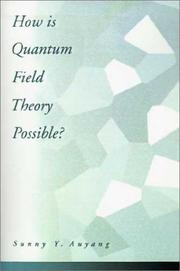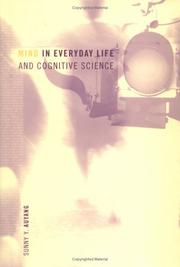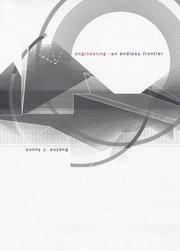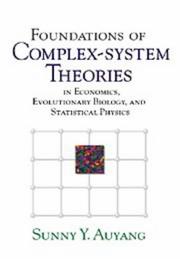| Listing 1 - 8 of 8 |
Sort by
|

ISBN: 0195093445 0195093453 9780195093452 Year: 1995 Publisher: New York (N.Y.): Oxford university press,
Abstract | Keywords | Export | Availability | Bookmark
 Loading...
Loading...Choose an application
- Reference Manager
- EndNote
- RefWorks (Direct export to RefWorks)
How can we know the microscopic world without a measurement theory? What are the general conditions of the world that make possible such knowledge? What are the presuppositions of physical theories? This book includes an analysis of quantum field theory, and quantum mechanics and interacting systems are addressed in a unified framework.
Champs [Théorie quantique des ] --- Espace et temps --- Quantum field theory --- Quantumvelden [Theorie van de ] --- Ruimte en tijd --- Space and time --- Space of more than three dimensions --- Space-time --- Space-time continuum --- Space-times --- Spacetime --- Temps et espace --- Tijd en ruimte --- Time and space --- Physics --- -Quantum field theory --- Fourth dimension --- Infinite --- Metaphysics --- Philosophy --- Space sciences --- Time --- Beginning --- Hyperspace --- Relativity (Physics) --- Relativistic quantum field theory --- Field theory (Physics) --- Quantum theory --- Natural philosophy --- Philosophy, Natural --- Physical sciences --- Dynamics --- Quantum field theory. --- Space and time. --- Philosophy. --- Physics. --- Physical Sciences & Mathematics --- Atomic Physics --- Physics - Philosophy

ISBN: 0262011816 0262267489 1423727533 0262261359 9780262267489 9780262011815 9780262261357 9781423727538 Year: 2000 Publisher: Cambridge, Mass. : MIT Press,
Abstract | Keywords | Export | Availability | Bookmark
 Loading...
Loading...Choose an application
- Reference Manager
- EndNote
- RefWorks (Direct export to RefWorks)
Annotation
Cognitive psychology --- Theory of knowledge --- Cognitive science. --- Intellect. --- Thought and thinking. --- Cognition. --- Intelligence. --- Thinking. --- Cognitive science --- Intellect --- Thought and thinking --- Thinking --- Cognition --- Intelligence --- Mental Processes --- Personality --- Psychological Phenomena and Processes --- Behavior and Behavior Mechanisms --- Psychiatry and Psychology --- Psychology --- Social Sciences --- Psychologic Processes --- Psychologic Processes and Principles --- Psychological Processes --- Phenomena, Psychological --- Processes, Psychologic --- Processes, Psychological --- Psychological Phenomenas --- Psychological Processe --- Personalities --- Human Characteristics --- Human Information Processing --- Information Processing, Human --- Cognitive Function --- Cognitions --- Cognitive Functions --- Function, Cognitive --- Functions, Cognitive --- Critical Thinking --- Thinking Skills --- Thought --- Thinking Skill --- Thinking, Critical --- Thoughts --- Mind --- Educational psychology --- Philosophy --- Logic --- Perception --- Psycholinguistics --- Self --- Human intelligence --- Ability --- Science --- Philosophy of mind --- COGNITIVE SCIENCES/General

ISBN: 128044195X 9786610441952 0195357612 1602560161 9781602560161 9780195357615 9781280441950 9780195093452 0195093453 9780195093445 0195093445 0195093453 0197732313 Year: 2023 Publisher: New York : Oxford University Press,
Abstract | Keywords | Export | Availability | Bookmark
 Loading...
Loading...Choose an application
- Reference Manager
- EndNote
- RefWorks (Direct export to RefWorks)
How can we know the microscopic world without a measurement theory? What are the general conditions of the world that make possible such knowledge? What are the presuppositions of physical theories? This book includes an analysis of quantum field theory, and quantum mechanics and interacting systems are addressed in a unified framework.
Quantum field theory. --- Physics --- Space and time. --- Space of more than three dimensions --- Space-time --- Space-time continuum --- Space-times --- Spacetime --- Time and space --- Fourth dimension --- Infinite --- Metaphysics --- Philosophy --- Space sciences --- Time --- Beginning --- Hyperspace --- Relativity (Physics) --- Relativistic quantum field theory --- Field theory (Physics) --- Quantum theory --- Philosophy.

ISBN: 0674020324 9780674020320 0674013328 9780674013322 9780674019782 Year: 2004 Publisher: Cambridge, MA : Harvard University Press,
Abstract | Keywords | Export | Availability | Bookmark
 Loading...
Loading...Choose an application
- Reference Manager
- EndNote
- RefWorks (Direct export to RefWorks)
Genetic engineering, nanotechnology, astrophysics, particle physics: We live in an engineered world, one where the distinctions between science and engineering, technology and research, are fast disappearing. This book shows how, at the dawn of the twenty-first century, the goals of natural scientists--to discover what was not known--and that of engineers--to create what did not exist--are undergoing an unprecedented convergence. Sunny Y. Auyang ranges widely in demonstrating that engineering today is not only a collaborator with science but its equal. In concise accounts of the emergence of industrial laboratories and chemical and electrical engineering, and in whirlwind histories of the machine tools and automobile industries and the rise of nuclear energy and information technology, her book presents a broad picture of modern engineering: its history, structure, technological achievements, and social responsibilities; its relation to natural science, business administration, and public policies. Auyang uses case studies such as the development of the F-117A Nighthawk and Boeing 777 aircraft, as well as the experiences of engineer-scientists such as Oliver Heaviside, engineer-entrepreneurs such as Henry Ford and Bill Gates, and engineer-managers such as Alfred Sloan and Jack Welch to give readers a clear sense of engineering's essential role in the future of scientific research. Table of Contents: Preface 1. Introduction 2 . Technology Takes Off 2.1 From Practical Art to Technology 2.2 Construction Becomes Mathematical 2.3 Experimenting with Machines 2.4 Science and Chemical Industries 2.5 Power and Communication 3. Engineering for Information 3.1 From Microelectronics to Nanotechnology 3.2 Computer Hardware and Software 3.3 Wireless, Satellites, and the Internet 4. Engineering in Society 4.1 Social Ascent and Images of Engineers 4.2 Partnership in Research and Development 4.3 Contributions to Sectors of the Economy 5. Innovation by Design 5.1 Inventive Thinking in Negative Feedback 5.2 Design Processes in Systems Engineering 5.3 “Working Together� in Aircraft Development 5.4 From Onboard Computers to Door Hinges 6. Sciences of Useful Systems 6.1 Mathematics in Engineering and Science 6.2 Information and Control Theories 6.3 Wind Tunnels and Internet Simulation 6.4 Integrative Materials Engineering 6.5 Biological Engineering Frontiers 7. Leaders Who Are Engineers 7.1 Business Leaders in the Car Industry 7.2 Public Policies and Nuclear Power 7.3 Managing Technological Risks Appendix A. Statistical Profiles of Engineers Appendix B. U.S. Research and Development Notes Index I am impressed by the scope of Engineering - An Endless Frontier, and fascinated by Sunny Auyang's comprehensive knowledge of the subject. This is just the kind of book the National Academy of Engineering has been encouraging to promote the importance of engineering to the public. It will have a long shelf-life in that it pulls together material that is not readily accessible, and will serve as a reference for anyone interested in engineering as a profession. Engineering needs this book!--John Hutchinson, Harvard UniversityEngineering - An Endless Frontier is extraordinary in scope. Sunny Auyang describes the different kinds of contemporary engineering practices and productions, attempts to provide historical background, explains the scientific basis for engineering innovation in different fields, and addresses the broad, systems level managerial, entrepreneurial, and design activities of professionals. It's rare to find a single author who can grasp and explain the essential features of modern technologies across such an array of industrial sectors and engineering disciplines and explain how they work, why they work they way they do, and what is required for their innovation, development and, yes, even maintenance.--Louis L. Bucciarelli, Professor Emeritus of Engineering and Technology Studies, MIT
Engineering. --- Construction --- Industrial arts --- Technology --- Engineering --- 62 --- Engineering. Technology in general

ISBN: 0521621674 Year: 1998 Publisher: Cambridge : Cambridge university press,
Abstract | Keywords | Export | Availability | Bookmark
 Loading...
Loading...Choose an application
- Reference Manager
- EndNote
- RefWorks (Direct export to RefWorks)
Biological systems. --- Economics. --- Statistical physics. --- System theory.
Book
ISBN: 9780765643704 0765643707 9780765643698 0765643693 Year: 2014 Publisher: Armonk, New York : M.E. Sharpe, Inc.,
Abstract | Keywords | Export | Availability | Bookmark
 Loading...
Loading...Choose an application
- Reference Manager
- EndNote
- RefWorks (Direct export to RefWorks)
Imperialism. --- Impérialisme --- China --- Rome --- Chine --- History --- Histoire
Book
ISBN: 0511824661 0511626134 Year: 1998 Publisher: Cambridge : Cambridge University Press,
Abstract | Keywords | Export | Availability | Bookmark
 Loading...
Loading...Choose an application
- Reference Manager
- EndNote
- RefWorks (Direct export to RefWorks)
Complex behaviour can occur in any system made up of large numbers of interacting constituents, be they atoms in a solid, cells in a living organism, or consumers in a national economy. Analysis of this behaviour often involves making important assumptions and approximations, the exact nature of which vary from subject to subject. Foundations of Complex-system Theories begins with a description of the general features of complexity and then examines a range of important concepts, such as theories of composite systems, collective phenomena, and stochastic processes. Each topic is discussed with reference to the fields of statistical physics, evolutionary biology, and economics, thereby highlighting recurrent themes in the study of complex systems. This detailed yet nontechnical book will appeal to anyone who wants to know more about complex systems and their behaviour. It will also be of great interest to specialists studying complexity in the physical, biological, and social sciences.
System theory. --- Statistical physics. --- Biological systems. --- Economics.
Digital
ISBN: 9780674020320 Year: 2022 Publisher: Cambridge, Mass. Harvard University Press
Abstract | Keywords | Export | Availability | Bookmark
 Loading...
Loading...Choose an application
- Reference Manager
- EndNote
- RefWorks (Direct export to RefWorks)
| Listing 1 - 8 of 8 |
Sort by
|

 Search
Search Feedback
Feedback About UniCat
About UniCat  Help
Help News
News